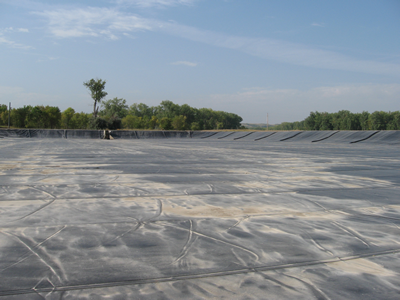
By Dr. Robert M. Koerner, P.E. – On Wednesday, December 11, from 11:30 am – 1:00 pm (Eastern), the Geosynthetic Institute (GSI) will continue its monthly webinar series. The forthcoming topic is “Geosynthetics in Agriculture and Aquaculture.”
REGISTER ONLINE
This webinar illustrates the many and varied applications of geosynthetics which can be (and have been) used in agriculture and aquaculture. The users are either focused on improved productivity or lower cost of operations.
A brief explanation of geosynthetics will begin the webinar followed by specific operations. In the agriculture area, these are various farming applications, confined animal feedlots, anaerobic digesters and emerging concepts. In the aquaculture area, these are lined ponds, factory controlled systems and offshore fish pens and cages.
Exposed geomembrane lifetimes will be offered from the perspective of laboratory predictions as well as a benefit/cost method for geomembrane solution. Conclusions in both areas will also be offered.
OBJECTIVES

Webinar participants will gain an overview of geosynthetics vis-à-vis various containment concepts. In the agriculture sector, specific issues of animal waste concerns (e.g., CAFOs) will be described as well as anaerobic digesters. In the aquaculture section, focus is on fish farming both on land and in water, including lakes and oceans.
Emerging concepts in agriculture such as enhancement of farming practices, geotextile capillary barriers, odor control floating covers, and odor permeable geomembranes will be presented. In aquaculture the use of geogrid enclosures will be emphasized. Exposed geomembrane lifetimes, via laboratory simulation methods, will be presented as will the benefit/cost methodology for selecting the optimum type of geomembrane.
BENEFITS
- Learn about geosynthetics and their functions
- Learn select aspects of farming and animal waste containment
- Learn specific aspects about CAFO’s, anaerobic digesters, and emerging concepts insofar as geosynthetic applications are concerned
- Learn about the three categories of fish farming insofar as fish growth and harvesting.
- Learn about exposed geomembrane lifetime predictions based on current technology
- Learn how to select geomembranes based on a benefit/cost ratio analysis
WHO SHOULD ATTEND
Agricultural engineers and developers dealing with all aspects of farming; aquaculture specialists in the various categories of implementation; geosynthetic manufacturers and representatives; design consultants and the testing organizations that serve them; academic and research groups; government agencies dealing with the agriculture and aquaculture industries; others desiring technical related information insofar as these geosynthetic applications are concerned.
TOPICS
- Geosynthetic Materials
- Farming Operations and Containment Concepts
- Confined Animal Feedlots and Anaerobic Digesters
- Emerging Concepts and Applications
- Aquaculture, aka “Fish Farms”
- Exposed Geomembrane Lifetimes
- Geomembrane Lifetimes and Selection Process
- Conclusions
INSTRUCTOR: Dr. Robert M. Koerner
COST: $200 GSI Members / $250 non-members
ABOUT THE PRESENTER
Dr. Robert M. Koerner’s (Professor Emeritus of Civil Engineering at Drexel University and Director Emeritus of the Geosynthetic Institute) interest in geosynthetics spans over thirty years of teaching, research, writing and advising. He holds his Ph.D. in Geotechnical Engineering from Duke University. He is a registered Professional Engineer in Pennsylvania, a Distinguished Member of ASCE, a Diplomate of the GeoInstitute and a member of the National Academy of Engineering. Bob has authored and co-authored about 650 papers on geosynthetics and geotechnical topics in journals and at national and international conferences. His most widely used publication is the sixth edition of the textbook entitled “Designing with Geosynthetics”. He is the founding director of the Geosynthetic Institute which is a nonprofit research and development organization dedicated to the proper use of geosynthetics in its myriad applications. The institute also provides laboratory accreditation and inspection certification programs.











